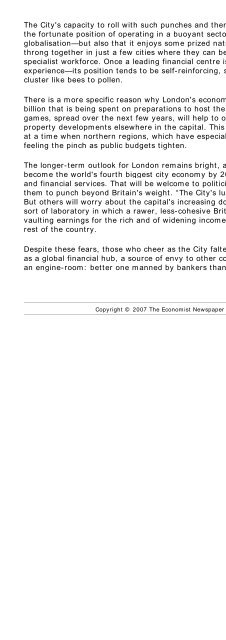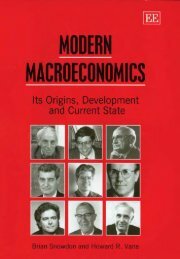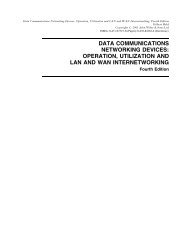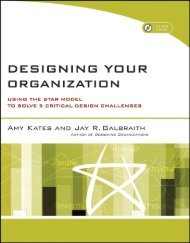The Economist December 1st 2007 - Online Public Access Catalog
The Economist December 1st 2007 - Online Public Access Catalog
The Economist December 1st 2007 - Online Public Access Catalog
- No tags were found...
You also want an ePaper? Increase the reach of your titles
YUMPU automatically turns print PDFs into web optimized ePapers that Google loves.
<strong>The</strong> City's capacity to roll with such punches and then regain the upper hand suggests not only that it is inthe fortunate position of operating in a buoyant sector—as international finance expands in response toglobalisation—but also that it enjoys some prized natural advantages. Global financial businesses tend tothrong together in just a few cities where they can be sure of drawing upon a big and highly skilledspecialist workforce. Once a leading financial centre is established—and the City has had centuries ofexperience—its position tends to be self-reinforcing, since businesses and talent are attracted to thecluster like bees to pollen.<strong>The</strong>re is a more specific reason why London's economy may prove resilient this time: the impact of the £9billion that is being spent on preparations to host the Olympic games in 2012. <strong>The</strong> building work for thegames, spread over the next few years, will help to offset the likely curtailment of some commercialpropertydevelopments elsewhere in the capital. This specific boost to the metropolitan economy will comeat a time when northern regions, which have especially benefited from Labour's big-spender ways, will befeeling the pinch as public budgets tighten.<strong>The</strong> longer-term outlook for London remains bright, according to PWC, whose study projects that it willbecome the world's fourth biggest city economy by 2020, driven in particular by strong growth in businessand financial services. That will be welcome to politicians who have found that the capital's clout enablesthem to punch beyond Britain's weight. “<strong>The</strong> City's lustre has burnished Labour's image,” says Mr Travers.But others will worry about the capital's increasing dominance. It has come to seem, for many people, asort of laboratory in which a rawer, less-cohesive Britain is emerging; a crowded, hustling place ofvaulting earnings for the rich and of widening income disparities, which drains talent and wealth from therest of the country.Despite these fears, those who cheer as the City falters, will be wrong. <strong>The</strong> gains from London's positionas a global financial hub, a source of envy to other countries, outweigh the losses. Every economy needsan engine-room: better one manned by bankers than none at all.Copyright © <strong>2007</strong> <strong>The</strong> <strong>Economist</strong> Newspaper and <strong>The</strong> <strong>Economist</strong> Group. All rights reserved.
















